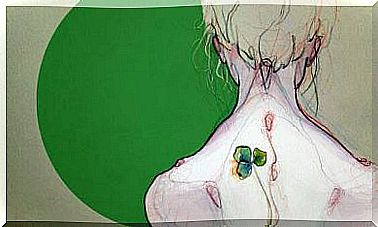Fortunata Syndrome: Addicted To Forbidden Love

Fortunata Syndrome is named after Benito Pérez Galdós’ short story Fortunata y Jacinta. It was written in the 19th century and filmed in the 1970s. Because of the amazing psychological depth of the characters in the short story, their names have been used to describe a particular phenomenon in romantic relationships.
The short story tells of the stormy relationship between a man, Juanito Santa Cruz, and two women: Jacinta and Fortunata. The former is the wife, and the latter is the mistress. In time, Fortunata becomes a prostitute and later marries Maximiliano. The relationship between Fortunata and her lover continues, however, and she has two children with him.
The most interesting thing about the short story is not the action itself, but the psychological analysis of each person. Fortunata represents women who are masters at having relationships with married men. People like her are said to have Fortunata syndrome.
Characteristics of Fortunata Syndrome
We do not consider Fortunata syndrome to be a disorder or a disease. In contrast, it is a rather unusual condition that affects certain women. In short, they feel more attracted to men who are already married.

The primary characteristics of a woman with Fortunata syndrome are as follows:
- Very strong, unconditional, deep feelings of love for married men.
- Without the ability to find other men attractive.
- Always ready to do anything for the man she loves.
- Convinced that life has no meaning without him.
- Feels that she has a “right” to him and that it is quite right that he prefers her over others.
- A desire to have children with the man.
- Unclear thoughts about the husband’s wife. Sometimes she is understanding towards her and other times she hates her.
- Constant fantasies about having a future with the man she loves.
To sum up, women with Fortunata syndrome are deeply in love with men who are already in a relationship. At the same time, however, they also feel that this love is unattainable because of the man’s real partner.
What is the cause of Fortunata syndrome?
The first triangular drama we experience in life often happens at a very young age. Freud wrote about it in the so-called Oedipus complex. He says that children can feel attracted to the mother and that they unconsciously want to take the place of the other parent.

In other words, the boy will take the father’s place, and the girl the mother’s place (also called Elektrakompleks ). The solution is a ban on incest: to accept reality and renounce all incestuous desires. All this is happening unconsciously.
Fortunata syndrome indicates a lack of resolution of the oedipal conflict. As an adult, the first great love, one’s own mother or father, is recreated in the person’s partner. The conflicts, expectations and desires they had as a child towards the father or mother are recreated in the relationship.
If “Oedipus” resolves itself, the person’s adult relationship becomes healthier. If not, they become something in the style of their first triangular drama. The woman is thereby more attracted to married men, who represent her father. And she will feel that the other woman is the cause of all her frustrations, as was the case with her mother.
Aspects that should be considered
When a woman experiences Fortunata syndrome, other traits are also normal.
- Low self-esteem.
- Problems recognizing one’s own emotions.
- Dependence.
- Puts high value in what they are allegedly sacrificing and sees it as a sign of love.
- An idealized view of love.

The woman will win over the wife of the man they love. They do not do it deliberately. It feels impossible to hold back. For the most part, they end up suffering and they experience great frustrations. They are advised to seek psychotherapy to solve the problem.









